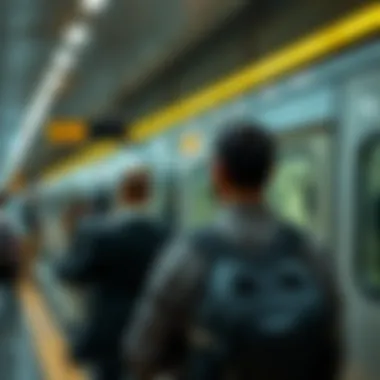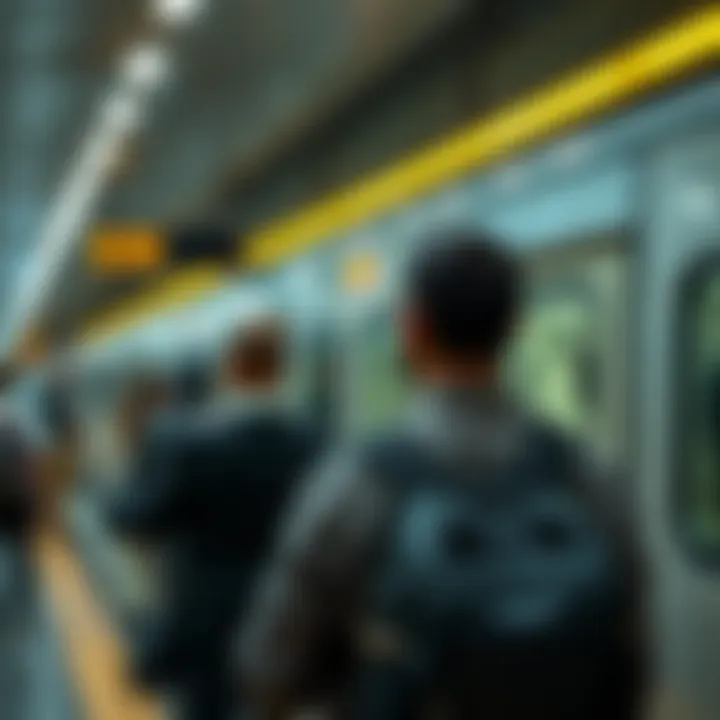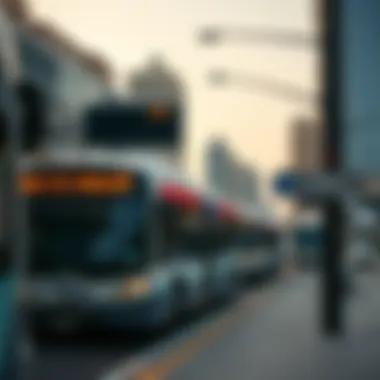Metro Closing Times in Dubai: A Detailed Overview


Intro
Navigating the Dubai Metro can be a game changer for both residents and visitors wandering through the dazzling city. Understanding its operational hours, particularly closing times, plays a crucial role in planning any journey. Not only do these hours impact your commuting decisions, but they also carry weight in real estate and investment opportunities tied to the availability of efficient public transport.
As Dubai continues to evolve, keeping an eye on the Metro's timelines provides insights that can help you make informed choices. This guide will delve into the nitty-gritty of Metro hours, reflecting how they ripple through various aspects of daily life in this vibrant metropolis.
Market Insights
Current Trends in Dubai Real Estate
With the rapid urbanization of Dubai, the real estate landscape is dynamic. Investors are particularly keen on properties near Metro stations. These areas often offer additional perks, such as better accessibility and the potential for higher rental returns. Closing times of the Metro factor significantly into this equation.
Key Considerations:
- Investment Opportunities: Areas like Dubai Marina and Jumeirah Lake Towers have seen a surge in demand for residential units surrounding Metro stations. This is due to the convenience of transportation for both locals and expatriates alike.
- Peak Hours: Understanding the peak hours of Metro operations can assist potential investors in realizing when transport will be most utilized, thereby influencing property values.
Analysis of Investment Opportunities
Investing in properties situated near Metro stations isn't just a hasty trend; it's a strategic move. Higher foot traffic means more visibility, which can lead to thriving businesses and flourishing communities. Here’s what we see when we map out the various properties along the Metro lines:
- High-density areas typically generate greater interest, resulting in quicker sales cycles.
- Families often target areas with easy public transport access, impacting property demand.
- Commercial interest increases in districts served by the Metro, marking these locations as attractive for business ventures.
"The relationship between transport accessibility and real estate value cannot be understated. Investors should keep a keen eye on Metro-related developments."
Neighborhood Features
Spotlight on Popular Developments
Some of the most sought-after developments in Dubai are those well-served by the Metro. Let's examine a few noteworthy neighborhoods:
- Business Bay: With its striking skyline and lively business environment, proximity to the Metro here often translates to premium property prices.
- BurDubai: Rich in culture and history but also well-connected, this area appeals to both tourists and residents.
- Downtown Dubai: Known for its luxury offerings, living near the Metro means convenience for social plans and daily commuting.
Comparison of Different Areas in Dubai
Not all neighborhoods are created equal, especially when we focus on the balance between nightlife and tranquility. Closings times of the Metro play an essential role in this:
- More vibrant districts often have later operating times, catering to night owls and event-goers.
- Residential neighborhoods might experience stricter closing hours, promoting a quieter environment.
Analyzing these subtle nuances can help potential buyers find their perfect niche, shaped largely by the Metro's operational hours.
In summary, understanding Metro closing timings in Dubai goes beyond knowing when to catch the train. It directly influences real estate dynamics, community living, and investment activities. This knowledge can empower various stakeholders to make choices aligned with their lifestyle or business ambitions.
Overview of the Dubai Metro System
The Dubai Metro stands as a quintessential facet of the emirate's public transportation, weaving its way through the urban landscape and connecting sprawling neighborhoods with commercial hubs. This article delves into the operational mechanics of this pivotal system, with a keen focus on its closing times. As Dubai continues to grow, understanding the metro's schedule becomes critical not just for daily commuters but also for investors and property managers who wish to gauge the pulse of the city's real estate.
Prelims to Dubai's Public Transport
Dubai's public transport isn't just an afterthought; it’s a well-orchestrated symphony of buses, water taxis, and the ever-reliable metro. The metro itself is a state-of-the-art network, with a line stretching over 75 kilometers, making it one of the longest automated metro systems. For residents and tourists alike, this means convenient access to key attractions, commercial centers, and residential districts, allowing individuals to navigate the bustling city with ease.
Daily operations are an essential component of any metro service, where punctuality and availability can make or break a routine. The metro operates on specific timing that aligns with the lifestyles of its users. For instance, early risers benefit from trains that kick-start their day at the crack of dawn, while night owls might face challenges once the final train fades into the distance.
Significance of the Metro in Urban Mobility
For many residents, the Dubai Metro is more than just a means of transport; it represents mobility freedom. The seamless operation and expansive reach mean people can venture far and wide without the burden of traffic snarls or exorbitant taxi fares. This accessibility plays a vital role in reducing congestion, offering a compelling alternative to traditional vehicular travel.
"The metro is the very vein of urban movement, circulating through the heart of Dubai and ensuring that its lifeblood—its people—can travel freely."
Moreover, the link between the metro and real estate development cannot be overstated. Proximity to metro stations often translates into increased property values, drawing in investors keen on tapping into the thriving housing market. This interplay marks the metro as a pivotal factor in urban planning, where every station can herald new opportunities for residential and commercial projects. The significance of understanding its operational hours is paramount—not only does it inform residents of their commuting choices, but it also aids developers in strategic planning based on traffic flow.
In summary, as we navigate through the specifics of the Dubai Metro's operating hours, it's clear that these times are not just numbers on a schedule; they are crucial indicators of urban life, directly affecting how Dubai's citizens and visitors engage with this magnificent city.


This foundational understanding provides readers with the lens through which to view the implications of closing hours, setting the stage for a deeper exploration of how these hours affect everyday life in Dubai.
Overall Metro Operating Hours
Understanding the overall operating hours of the Dubai Metro is essential for commuters, tourists, and investors alike. These hours dictate the availability of this crucial public transport system, influencing not just daily travel but also broader urban mobility and economic development within the city. Comprehending these timeframes helps individuals plan their travel effectively, ensuring they can make the most of this expansive network.
The Dubai Metro operates everyday from early in the morning until late at night. This range of hours accommodates both the rush-hour crowd and those needing late-night transportation options. For business travelers and tourists, knowing the metropolitan transit times can afford them added flexibility when arranging schedules for meetings or sightseeing. It's also invaluable for residents who rely on this urban lifeline for their everyday commutes.
Here are some key benefits of understanding metro operating hours:
- Travel Planning: Knowing when the Metro operates helps commuters avoid inconvenient downtime.
- Business Efficiency: Companies recognize that certain hours see peak commuter traffic, which can affect punctuality in business operations.
- Urban Development Insight: Investors can assess how public transport availability impacts nearby real estate value.
This guide will provide clarity on the specific operating hours during different times of the week.
General Daily Schedule
The Dubai Metro generally operates from 5:00 AM to midnight, with slight variations depending on the day of the week. This consistent schedule underscores a commitment to providing reliable public transport. Riders can always count on the Metro as a functional and efficient means of travel within the city. Having a fixed schedule helps in forming a commuting rhythm—allowing frequent riders to develop habits around these hours.
Sunday to Wednesday Timings
From Sunday to Wednesday, the Metro tends to function from 5:00 AM to midnight, maintaining a steady rhythm. During these days, traffic can be consistently busy during weekdays as many individuals commute to work, making the morning and evening rush hours significant. This predictability is excellent for those needing transport during the workweek. Knowing these hours enables commuters to avoid crowded cars and plan their arriving or departing times around peak hours for a smoother journey.
Thursday and Friday Closing Times
On Thursdays, just before the weekend kicks in, the closing time shifts to 1:00 AM. Fridays, being the start of the weekend, see a later opening at 10:00 AM and a closing time of midnight. This adjustment is crucial for nightlife in Dubai, as many people venture out to enjoy the vibrant restaurant and entertainment scenes. The extended hours allow for easier travel to social hubs, while also serving as a cue for businesses in the vicinity to adjust their hours accordingly.
Saturday Service Hours
Saturdays mirror the Thursday schedule, with operation running from 10:00 AM until midnight. This approach accommodates a leisurely weekend vibe, appealing to tourists and residents who wish to explore the city more freely. With a more relaxed opening time, the Metro serves as a flexible option for daytime outings, whether for shopping, cultural visits, or simply enjoying the public parks and outdoor spaces.
In essence, understanding these operational hours is pertinent for anyone navigating the Dubai area, whether they are here for business or leisure. The ability to adapt travel plans around the Metro’s operating times can make journeys more efficient and stress-free.
Factors Affecting Closing Times
Understanding the closing times of the Dubai Metro isn't just about knowing when the last train rolls out; it’s about grasping the broader context in which these schedules operate. Several factors play a vital role in determining these hours, each with its nuances and implications for daily commuters and urban planners alike. This section dives into the significance of these factors, which not only affect operational efficiency but also impact the overall commuting experience in Dubai.
Public Holidays and Special Events
In Dubai, public holidays and special events can influence metro schedules significantly. These occasions, such as Eid celebrations or the Dubai Shopping Festival, often result in extended hours to accommodate the influx of commuters. For instance, on UAE National Day, the metro might operate later to ensure that residents can enjoy the festivities without the stress of transportation.
- Increased scheduling flexibility: During these periods, the Metro often adjusts its timetable. For example, trains may split off from the usual schedule, running more frequently or, in some cases, extending service for a few extra hours into the night.
- Peak commuter spikes: Special events can also pump up the number of passengers. The authorities closely monitor passenger flow on such days, which can lead to a last-minute decision to adjust closing times to prevent overcrowding.
This phenomenon illustrates how deeply intertwined transport logistics are with the cultural and social fabric of the city. Commuters should keep an eye on announcements or consult the Metro’s mobile app for real-time updates concerning changes in service during these holidays.
Maintenance Schedules
Routine maintenance is another critical aspect of the Metro's operational landscape. Like any complex system, the Dubai Metro requires regular check-ups to ensure safety and efficiency. Maintenance schedules can lead to changes in closing times, typically during off-peak hours to minimize disruption.
- Scheduled maintenance vs. emergency repairs: While planned maintenance generally results in predictable changes, unexpected repairs can disrupt service more abruptly.
- Impact awareness: Passengers need to be aware of these maintenance windows, as they can fluctuate. It’s wise to check the Metro’s official channels ahead of time to avoid surprises.
Such proactive communication helps commuters plan their journeys better, emphasizing the importance of being informed about service announcements and schedules.
Seasonal Variations
Dubai experiences unique seasonal variations that can also have an effect on metro operating hours. The summer heat, for instance, draws both locals and tourists indoors, generally leading to decreased foot traffic at certain times.
- Adjusting operating hours: Operators may modify closing times during peak summer months, where extended evening hours might be implemented to encourage transit use during cooler evenings.
- Tourist influx: Conversely, during the other months, particularly around holidays, there might be an uptick in tourists, necessitating longer hours to accommodate the increased demand for transportation.
Understanding these seasonal patterns can help commuters strategize their travel plans, ensuring they take full advantage of the Metro services aligning with varied timeframes throughout the year.
Impact of Closing Times on Commuters


Understanding the impact of metro closing times is crucial for anyone navigating the busy streets of Dubai. For both residents and visitors, these timings heavily influence commuting habits and overall urban mobility. Closing times dictate when individuals can rely on the metro system, whether for work, leisure, or perhaps even for catching the last bit of nightlife. They embody a rhythm that shapes daily life in this vibrant city.
Analysis of Rush Hour Dynamics
Rush hours in Dubai can resemble a bubbling pot—when commuting is at its peak, everything seems to reach a boiling point. Typically, the metro sees the highest ridership during the early morning and late afternoon slots on weekdays. The system is designed to accommodate this influx, but closing times can throw a wrench into the works. For instance, the early closing of trains relative to office hours might leave late-shifting workers stranded, impacting their productivity and travel plans.
- Understanding peak hours: During rush hour, the urgency of travelers increases significantly. Closing times that fall before official working hours end can lead to crowds lining up just to catch the last train, often resulting in frustrations and delays. Commuters may have to rethink their departure times to align with metro operations.
- Alternatives and adjustments:
As a way to cope, many commuters adjust their schedules, relying on taxis or carpooling. This not only adds to personal costs but also contributes to additional road congestion—a real kicker for a city already known for its heavy traffic.
Challenges Faced by Night Owls
For the night owls among us, Dubai Metro’s closing times present unique hurdles. With evening entertainment blooming in parts like Downtown Dubai or Jumeirah, many find themselves limited in their options for safe and efficient transport post-closure. This can limit social interactions and even impact economic activities during late hours.
- Social life constraints: With metro services typically winding down relatively early, social butterflies may need to reshuffle their nightlife plans, often leading to less dynamic cultural engagement. The buzz of late-night eateries, lounges, and events might go unnoticed, as travelers are concerned about making calls to book an Uber or a taxi to return home.
- Increased travel costs:
The financial implications can add up too—where a metro fare might cost just a few dirhams, late-night taxis can hit the wallet hard with surge pricing and long waits. Additionally, the safety aspect isn’t to be glossed over; late-night travel on public transport can feel less secure, particularly for solo travelers.
In summary, metro closing times substantially affect the commuting experience in Dubai. As factors shift and evolve in this cosmopolitan environment, both residents and stakeholders in the real estate market must remain cognizant of these dynamics and their broader implications for urban life.
"The rhythm of a city is often dictated by its transport system, and nowhere is this more evident than in the bustling heart of Dubai.”
To explore more about urban commuting dynamics, visit Wikipedia or check discussions on Reddit to see what locals say about navigating the transit system during off-hours.
Travel Alternatives Outside Metro Hours
As the sun dips below the horizon, commuters find themselves grappling with the aftermath of the Dubai Metro's closing times. While the Metro serves as a lifeline during the day, its operational hours leave many pondering how to navigate the city after hours. This section elucidates the various travel alternatives available for those needing to get around when the Metro is offline, highlighting their significance in maintaining mobility and convenience for residents and tourists alike.
Dubai's Taxi System
Dubai's taxi system remains a cornerstone for transportation outside of Metro hours. With thousands of vehicles roaming the city, they offer an efficient and widely used option for late-night travel. Interestingly, taxis in Dubai can be a mixed bag - some are modern, while others seem more like a trip down memory lane. The fleet is managed by the Roads and Transport Authority (RTA), ensuring a level of standards and safety.
- Convenience: Taxis can be booked through various methods, including street hail, by phone, or via mobile apps.
- Availability: They are generally available 24/7, which positions them well for anyone who needs to make a late-night trek.
- Cost Consideration: While fares aren't exorbitant, they're certainly more than what you'd pay for a Metro ticket. So, budgeting wisely is key, especially if you're traveling often.
Moreover, taxi drivers are usually quite familiar with the city layout, often offering insights or quick routes that aren't as apparent to a foreign traveler. It can be a comforting option, especially for those who might be feeling a tad lost after dark.
Ride-Hailing Services
In stride with global trends, ride-hailing services have firmly established a presence in Dubai. Apps like Uber and Careem have revolutionized how people think about on-demand transportation. Here are a few reasons why these services are particularly valuable during off-Metro hours:
- User-Friendly Apps: With a few taps on a smartphone, you can secure a ride without breaking a sweat. The estimated arrival time, fare calculation, and driver details are all accessible at your fingertips.
- Variety of Choices: Depending on the service, you can choose between standard rides, luxury options, or even larger vehicles for group travel.
- Promotions and Discounts: Regular users benefit from various promotions, which can make these services more affordable than taxis over time.
However, it's worth noting that during rush hours or peak times, prices can surge. This fluctuation means one should always check the app before making a commitment to avoid any unpleasant surprises.
Buses and Other Public Transport
Lastly, don't overlook the public bus system as a reliable alternative for evening travel. Though it may not have the swank of the Metro, Dubai's buses have their own charm and benefit greatly from the integration with other public transport. Here’s why considering a bus might be worth your while:
- Extended Coverage: Buses serve areas the Metro does not, reaching suburban neighborhoods and popular locales that a traveler might need to access late at night.
- Cost-Effective: Fare prices are significantly lower compared to taxis or ride-hailing services, making this an attractive option for budget-conscious travelers.
- Night Routes Available: Night buses operate on certain routes, ensuring that those needing to travel during the wee hours still have options.
In summary, while the Dubai Metro possesses commendable advantages for daytime travel, understanding the available alternatives outside its operational hours enhances overall mobility. Taxis, ride-hailing services, and public buses collectively ensure that not a single corner of Dubai remains inaccessible, even after dark. Making informed choices about these options is paramount, particularly for investors, property managers, and home buyers keen on understanding the dynamics of travel in relation to real estate development.
The Role of the Metro in Real Estate Development
The Dubai Metro has markedly influenced the urban landscape, carving out a new reality for real estate development. As a prominent fixture in the city’s transportation infrastructure, it plays a significant role in determining property values and shaping development trends. This section delves into the different facets of the metro’s impact on real estate, exploring its potential to reshape neighborhoods, boost accessibility, and guide urban planning.
Influence on Property Value
The presence of a metro station can vastly enhance property values, transforming the character of an area almost overnight. Properties within close proximity to metro stations generally command higher prices, reflecting the desirability of easy access to public transport. This isn’t just a theory; it holds water in various cities around the globe, and Dubai seems to echo this trend.
For instance, areas like Dubai Marina and Burj Khalifa benefit greatly from their closeness to metro stations. Residents in these neighborhoods enjoy smoother commutes, which enhances their overall quality of life. Consequently, properties in these areas can see a price increase averaging 10-20% compared to similar properties located further from metro stations. Investors keen on maximizing returns must pay close attention to developments in connectivity when choosing where to invest.
Developments Near Metro Stations
Metro stations often become catalysts for urban development. Developers are increasingly looking at sites near these stations, recognizing their draw for both residential and commercial properties. Projects like the Dubai Hills Estate and the Rashidiya Metro Station vicinity highlight the trend where developers curate living spaces tied closely to metro access.


Key benefits of developments near metro stations include:
- Increased foot traffic: Retail outlets near metro stations attract more customers, boosting local businesses.
- Sustainability: With easy access to public transport, more people are inclined to use it rather than drive, reducing traffic congestion and environmental impact.
- High demand for housing: As more individuals seek to live conveniently near their workplaces, demand for housing in these areas can surge, driving up both sales and rental prices.
The ripple effect isn't limited to new constructions; existing properties often see a revitalization in value due to improved accessibility.
Urban Planning Considerations
Urban planners in Dubai are acutely aware of the metro's potential in influencing the city’s growth. Integrating metro stations into the broader urban planning strategy not only enhances public transport options but also leads to more cohesive neighborhood development. Such integration promotes mixed-use developments where residential areas coexist with retail and recreational spaces, engendering vibrant communities.
Moreover, planners take heed of the long-term vision for the city. Projects that extend metro lines often lead developers to update their plans, aligning them with the city’s transportation master plan. This proactive approach fosters strategic growth around transportation hubs, ensuring that developments are future-proof.
"The future of real estate lies at the intersection of transport and urban living; with the metro as a backbone, Dubai's communities are destined for expansion and evolution."
As the Dubai Metro continues to expand, it remains pivotal in redefining the cityscape, offering countless opportunities for growth. Investors and property managers should therefore stay attuned to how metro developments may influence their strategic decisions.
Future Outlook for the Dubai Metro
The future of the Dubai Metro holds significant potential, as the city's rapid growth and innovation demand advanced transportation solutions. Planning and enhancing metro services is not just about expanding tracks and stations; it is about strategic vision to create a more connected urban environment. The ever-increasing population and economic development put pressure on existing infrastructure, necessitating contemplations not only on capacity but also on community needs and environmental factors.
A robust vision for the future ensures that the metro alleviates traffic congestion, promotes sustainable travel, and aligns with Dubai's overarching goals as a global metropolis. In this section, we will delve into insights that point towards potential extensions and upgrades in the metro system, as well as the role of technology in mirroring the evolving demands.
Potential Extensions and Upgrades
With an eye towards further urban expansion, potential metro extensions in Dubai reflect the city’s ambitious plans. Infrastructure developments like the Dubai Creek Tower and new residential areas in Dubai South are fueling discussions on additional routes. For instance, the potential for an extension to Al Maktoum International Airport presents an attractive avenue for investors and travelers alike. Not only would this improvement facilitate easier access to transportation for passengers, but also attract travelers who prefer seamless transfers from air to rail.
In addition to geographic extensions, upgrading existing systems to incorporate additional lines and faster trains is also under consideration. Longer trains could reduce congestion during peak hours and enhance the overall experience for commuters.
Moreover, facilities such as integrated ticketing systems could emerge, enabling users to switch seamlessly between different modes of transport via single access passes. Such developments not only bring convenience but can also boost real estate values in proximity to metro stations, making it an enticing proposition for investors and property managers alike.
Technological Advancements
As the world moves swiftly into an era of digital connectivity, the Dubai Metro is positioned to harness technological advancements geared towards optimizing operations and improving passenger experience. Integrating smart technologies is crucial for ensuring safety and efficiency in metro services.
For instance, implementing advanced AI-based management systems could optimize scheduling and real-time updates to users. Imagine getting notified on your phone regarding last-minute changes, a real blessing during rush hour! Moreover, smart systems may analyze commuter patterns to suggest optimal travel times, directly responding to the dynamic urban environment.
Additionally, contactless payment systems present glowingly ahead for Dubai Metro commuters. The advent of mobile apps, utilizing QR codes and digital wallets, would minimize queues and speed up access to the metro.
As sustainability increasingly becomes a focal point in urban planning, systems that use renewable energy, such as solar-powered stations, can substantiate the eco-friendly image of Dubai's transportation ethos.
“The railway is a way of bringing together the different cultures of the country, facilitating interaction and boosting sustainable growth.”
For further information about the Dubai Metro developments, consider checking reports on Dubai RTA.
Closure
Summarizing the key points related to the Dubai Metro's closing times helps to clarify the overall significance of this public transport system. Understanding when the metro ceases operations not only aids in daily commuting decisions but also highlights the broader implications for urban planning and property markets.
When considering this information, one must reflect on key elements such as:
- Daily Schedule Context: Knowing the opening and closing hours on different days allows commuters to plan their journeys effectively.
- Impact on Commuters: Closing times shape the travel habits of residents and tourists, which is vital to understanding peak usage times.
- Real Estate Considerations: Investors and property managers should note how the proximity to metro stations influences property values, especially when considering the convenience and connectivity provided by the transport system.
Thus, presenting a clear and informative overview of metro closing times is essential for everyone, from commuters trying to get home after late-night events to property developers plotting their next investment. This nuanced understanding lays the groundwork for smarter decisions and strategic planning in the metropolitan landscape.
Summarizing Key Points
As we bring the discussion to a close, it’s prudent to recap the central arguments drawn from this exploration:
- The Dubai Metro operates on varied schedules depending on the day of the week. This variability caters to different commuter needs throughout the week, from busy workdays to relaxed weekends.
- Understanding the implications of closing times extends beyond commuters; real estate investment decisions can pivot based on metro access.
- Public holidays, maintenance schedules, and seasonal changes all play a role in shaping the operational hours of the metro, emphasizing the need for adaptability in travel plans.
By aligning the insights with practical needs—highlighting peak hours and accessing alternative transport—it makes daily commuting in Dubai more manageable.
Final Thoughts on Metro Closing Times
The effectiveness of the Dubai Metro as a transportation option greatly hinges on its closing times. A well-planned metro schedule reflects the city's commitment to improving urban mobility and catering to the diverse needs of its residents and visitors.
- The reliability of the metro system influences public confidence, impacting commuting choices positively.
- For property investors, the metro’s operational hours directly correlate to the desirability of locations surrounding metro stations.
- Looking to the future, continuous upgrades and extensions may provide further enhancements to the existing schedule, potentially even extending hours to accommodate a growing population.















